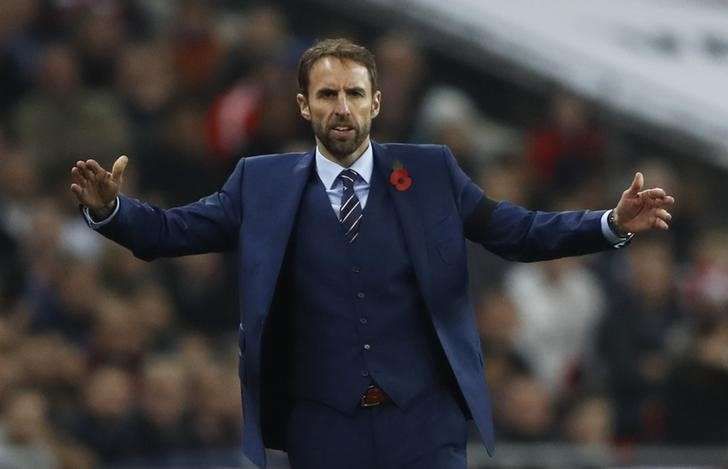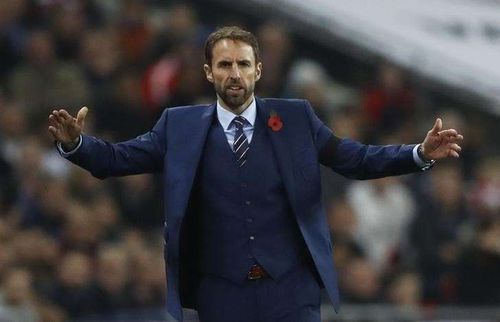
Unassuming Southgate takes on England's impossible job

By Neil Robinson
LONDON (Reuters) - Gareth Southgate was charged with bringing success to England's under-achieving footballers on Wednesday when he was confirmed as the team's permanent manager, a job that has defeated some of the best football brains over half a century.
Passionate former England players like Kevin Keegan and Glenn Hoddle, foreign coaches such as Sven-Goran Eriksson and Fabio Capello and experienced old hands including Graham Taylor and Roy Hodgson, have all failed as one of the game's most difficult and lucrative jobs has proved a mission too far.
Having tried almost every permutation and spent millions on wages, the FA has now adopted on a new approach to try to emulate 1966 World Cup winner Alf Ramsey, the only England manager to win a major trophy, by promoting a quietly spoken and thoughtful former international from within its own ranks.
The 46-year-old Southgate, who has signed a four-year contract, has impressed the Football Association since stepping up from the under-21 team to succeed Sam Allardyce, who departed after just 67 days following a newspaper sting.
A draw against Slovenia and wins over Malta and Scotland in 2018 World Cup qualifiers were followed by a 2-2 friendly draw with Spain, although Southgate's reign as interim coach was marred by pictures of Wayne Rooney socialising late at night.
The captain apologised "unreservedly" after the publication of what he called "inappropriate" images for someone in his position while on international duty after the Scotland game.
HARD WORK
Compared with other England scandals it was comparatively small beer but it served as a warning to Southgate of the issues he will be grappling with in a country that still expects its team to beat the world's best despite all the evidence suggesting they are now a second-tier football nation.
"I'm determined to give everything I have to give the country a team that they're proud of and one that they're going to enjoy watching play and develop. For me, the hard work starts now," said Southgate whose first task is reaching the World Cup.
It says much about the limitations of English football culture that Southgate was seen as too posh and well-educated to succeed, a generalisation based on a middle-class upbringing and educational qualifications beyond the footballing norm.
In other professions it might have been seen as a strength but in football it marked him out as different and Southgate has spent years proving himself after becoming the youngest captain in the country at 22 with his first club, Crystal Palace.
Playing in an average side, he soon established himself as a versatile centre half and midfielder, before enjoying a successful career which also saw him play for Aston Villa and Middlesbrough over almost 650 games and 18 years.
In between he also played 57 times in an England team that was anything but the national joke it has since become. Under Terry Venables, Southgate established himself as a new-age defender who knew how to do more than clear his lines.
He was always comfortable on the ball, and aware of the possibilities off it, playing every minute of England's Euro '96 campaign - the last time they reached a tournament semi-final.
CLUB HIGHS
There were highs at club level too, as he became the first Middlesbrough captain to lift a major trophy when they won the League Cup in 2004 and signed off in the 2006 UEFA Cup final.
When Steve McClaren left 'Boro to become another failed England manager, Southgate replaced him even though he did not have the required coaching badges.
His 3-1/2 years in charge, which ended with the club in the Championship (second tier), remains his only day-to-day management experience.
Southgate has subsequently mixed television punditry with working for the FA as head of elite development and then England Under-21 manager.
As a CV it is not much to set against that of Hodgson, say, who managed 16 teams in eight countries, or Italian Capello, who was in charge at Inter Milan and Real Madrid, but the FA could be forgiven to saying 'so what?'.
No one doubts Southgate, an assured speaker who once planned to become a journalist, ticks all the right boxes off the field but, ultimately, he will be judged on whether he can end England's years of under-achievement.
"Gareth is a great ambassador for what The FA stands for, he's a very good football tactician and a leader but beneath that he's a winner and that's an important part of the job," FA chief executive Martin Glenn said following his appointment.
Being an unassuming sort, Southgate will no doubt admit that better men than him have failed to live up to the job spec. The advantage this time is that nobody is expecting too much.
(Reporting by Neil Robinson; Editing by Ken Ferris)